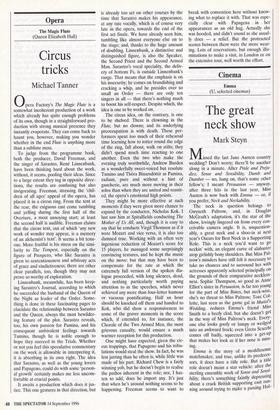Opera
The Magic Flute (Queen Elizabeth Hall)
Circus tricks
Michael Tanner
Opera Factory's The Magic Flute is a somewhat incoherent production of a work which already has quite enough problems of its own, though in a straightforward pro- duction with strong musical presence they instantly evaporate. They can come back to haunt you, however, making you wonder whether in the end Flute is anything more than a sublime mess.
To judge from the programme book, both the producer, David Freeman, and the singer of Sarastro, Rene Linnenbank, have been thinking hard about the work, without, it seems, pooling their ideas. Since to a large extent they tug in opposite direc- tions, the results are confusing but also invigorating. Freeman, stressing the 'chil- dren of all ages' appeal of the opera, has placed it in a circus ring. From the tent at the rear, the exiguous cast come tumbling and yelling during the first half of the Overture, a most annoying start; at least the second half is audible. Freeman claims that the circus tent, out of which 'any new work of wonder may appear, is a memory of an alchemist's tent'. It seems a bit tenu- ous. More fruitful is his stress on the simi- larity to The Tempest, especially on the figure of Prospero, who like Sarastro is given to sententiousness and arbitrary acts of grace and vindictiveness; there are other clear parallels, too, though they may not prove so worthy of exploration.
Linnenbank, meanwhile, has been keep- ing Sarastro's Journal, according to which he succeeded the husband of the Queen of the Night as leader of the Order. Some- thing is done in these fascinating pages to elucidate the relationship between Sarastro and the Queen, always the most bewilder- ing feature of the plot. Sarastro reveals, too, his own passion for Pamina, and his consequent ambivalent feelings towards Tamino, though he is noble enough to hope they succeed in the Trials. Whether or not you feel this speculative commentary on the work is allowable in interpreting it, it is absorbing in its own right. The idea that Sarastro, as well as the young lovers and Papageno, could do with some 'person- al growth' certainly makes me less uncom- fortable at crucial points.
It awaits a production which does it jus- tice. This one gestures in that direction, but is already too set on other courses by the time that Sarastro makes his appearance, at any rate vocally, which is of course very late in the opera, towards the end of the first act finale. We have already seen him, tumbling like almost everyone else on to the stage; and, thanks to the huge amount of doubling, Linnenbank, a distinctive and distinguished figure, is also the Speaker, the Second Priest and the Second Armed Man. Sarastro's vocal speciality, the deliv- ery of bottom Fs, is outside Linnenbank's range. That means that the emphasis is on his insecurity; he comes on brandishing and cracking a whip, and he presides over so small an Order — there are only ten singers in all — that there's nothing much to boost his self-respect. Despite which, the idea is one to be worked on.
The circus idea, on the contrary, is one to be shelved. There is clowning in the Flute, but no clowns; and its underlying preoccupation is with death. These per- formers spent too much of their rehearsal time learning how to totter round the edge of the ring, fall about, walk on stilts; they didn't spend much time reacting to one another. Even the two who make the evening truly worthwhile, Andrew Burden as a wonderfully sweet-voiced but resolute Tamino and Th6ra Binarsd6ttir as Pamina, radiant, pure and without a hint of gaucherie, are much more moving in their solos than when they are united and reunit- ed, the opera's emotional high points.
They might be more effective at such moments if they were given more chance to expand by the conductor, Nicholas Kok. I last saw him at Spitalfields conducting The Mother of Us All, and, though it is easy to say that he conducts Virgil Thomson as if it were Mozart and vice versa, it is also too damned true. Working with an often very ingenious reduction of Mozart's score for 15 players, he managed some surprisingly convincing textures, and he kept the music on the move: but that may have been to compensate for the rate at which the extremely full version of the spoken dia- logue proceeded, with long silences, dead, and nothing particularly worth paying attention to in the speeches, which never achieved any more than four-letter humour or vacuous pontificating. Half an hour should be knocked off them and handed to Kok, who did show a responsiveness to some of the graver moments in the score which, if extended to, for instance, the Chorale of the Two Armed Men, the most grievous casualty, would ensure a much warmer reception for this production.
One might have expected, given the cir- cus trappings, that Papageno and his tribu- lations would steal the show. In fact, he was less jarring than he often is, while little was made of his part. Richard Chew is a fairly winning yob, but he doesn't begin to realise the pathos inherent in the role; nor, I has- ten to add, does he import any. It's just that when he's around nothing seems to be happening. Freeman seems to want to break with convention here without know- ing what to replace it with. That was espe- cially clear with Papagena in her appearances as an old hag. Actually she was hooded, and didn't sound as she usual- ly does — a relief. But the protracted scenes between them were the more wear- ing. Lots of reservations, but enough illu- minations to make a visit, in London or on the extensive tour, well worth the effort.


































































 Previous page
Previous page